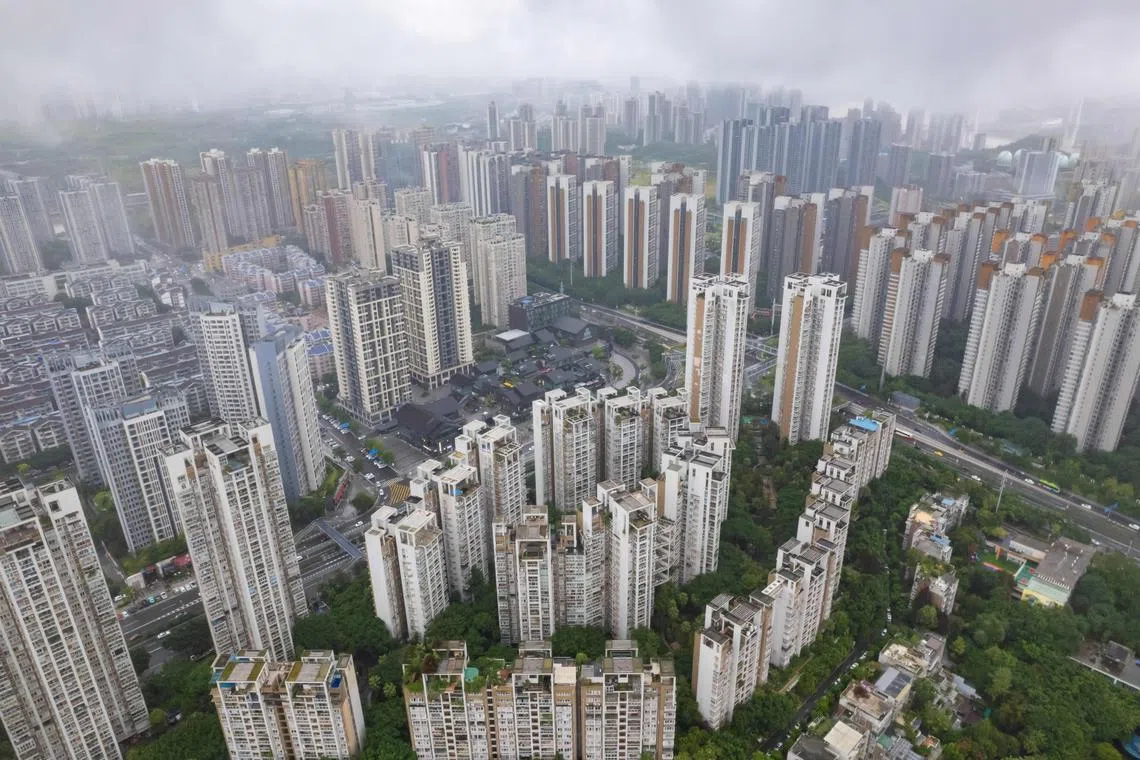China’s ailing property market faces key test over Golden Week
Sign up now: Get insights on Asia's fast-moving developments

Some builders are already taking aggressive steps to entice homebuyers.
PHOTO: AFP
BEIJING – Chinese developers are counting on the upcoming Golden Week holiday period to spark a long-awaited revival in home sales, in the first key test of whether recent policy support is enough to arrest the slump.
The eight-day national holiday starting from Friday is the centre point of the industry’s September-October busy season.
The stakes are higher than ever in 2023, as the housing slowdown weighs on China’s economic recovery and developers that are struggling to refinance rely on cash from sales to meet debt obligations.
“Property sales this year have been very lacklustre, so for most developers, accelerating transactions in the two months will be especially crucial,” said Mr Zhang Hongwei, founder of Jingjian Consulting, which advises real estate companies. “Otherwise, they will need to take a bigger hit to push for better sales towards the year end.”
If sales are not good enough by October, local governments will roll out more stimulus, he added.
An easing of mortgage restrictions at the end of August
That is prompting speculation that policymakers will need to do more to revive sentiment, which has been hammered by worries over unfinished apartments, falling property values, high unemployment and dwindling incomes.
A Bloomberg Intelligence gauge of developer shares fell the most in 2023 on Monday after China Evergrande Group said it must revisit its debt restructuring plan, raising the risk of a liquidation of the nation’s most indebted builder.
Another former property giant, Country Garden Holdings, is trying to stave off a default.
Some builders are already taking aggressive steps to entice home buyers. One developer in Guangdong is offering incentives to buyers of its Royal Skyrim apartments in Shenzhen to purchase additional properties elsewhere in the province.
They can enjoy down payments of as low as 20 per cent at its project in smaller Dongguan city nearby, according to agents.
Thirteen developers from Harbin, the capital of China’s northernmost province, went to the eastern city of Nanjing to promote their 21 projects recently, hoping that buyers fond of travelling would consider them as holiday residences.
The local authorities are helping out, too. A city government in central Anhui province gave out 5,000 spending vouchers of as much as US$137 (S$187) each to home buyers, according to an official announcement.
To seize the sales window, the local authorities have been following one another to stimulate housing demand in recent weeks.
Some have loosened rules banning non-residents from purchasing property there.
Guangzhou made such a move in some urban areas last week, marking one of the most significant steps taken in a Tier 1 city.
Beijing and Shanghai still restrict non-locals from buying property and place limits on how many units each household can own.
“Whether Tier 1 cities will step up loosening depends on how much their housing markets recover,” said China Index Holdings associate research director Chen Wenjing . “The Guangzhou move signals that it’s not impossible any more.”
Potential policies include making more people eligible for purchases in suburban areas, where sales are usually more lacklustre.
Home buyers are also watching whether Beijing, Shanghai and Shenzhen will reduce their minimum mortgage rates for first homes to lower floors guided by the central bank earlier in September.
Still, there are entrenched barriers to a recovery that such measures cannot easily overcome.
As well as the tough job market, China’s ageing population and an oversupply of housing limit the upside for investing in real estate.
Officials are treading a fine line on how far to push stimulus.
While a persistent real estate slump poses risks to the government’s growth target of 5 per cent in 2023, it wants to reduce the economy’s reliance on a leverage-driven property market in the long run. For now, the expectation that home values will keep falling is among the biggest factors deterring buyers.
Home prices dropped the most in 10 months in August, led by declines in smaller cities.
“Expectations on housing prices have gradually stabilised, but the outlook on most Tier 2 cities and smaller cities is still negative,” said China Index’s Ms Chen. “For most cities in China, the home market needs to take more time to recover.” BLOOMBERG


